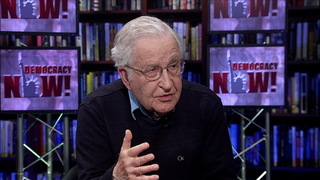
Topics
Guests
- Noam Chomskyworld-renowned political dissident, linguist and author. He is institute professor emeritus at Massachusetts Institute of Technology, where he has taught for more than 50 years. His new book comes out today, titled Requiem for the American Dream: The 10 Principles of Concentration of Wealth & Power.
As worldwide outrage mounts over an alleged chemical weapons attack in Idlib province, which was reportedly carried out by the Assad government, we speak with world-renowned political dissident, linguist and author Noam Chomsky about the ongoing conflict in Syria.
Transcript
AMY GOODMAN: We turn now to Noam Chomsky, one of the world’s best-known dissidents. He’s institute professor emeritus at Massachusetts Institute of Technology, where he taught for more than 50 years. Juan González and I spoke to him live on Democracy Now! on Tuesday’s program. After the broadcast, we continued the conversation. I asked him to talk about the situation in Syria, as well as the broader Middle East.
NOAM CHOMSKY: Syria is a horrible catastrophe. The Assad regime is a moral disgrace. They’re carrying out horrendous acts, the Russians with them.
AMY GOODMAN: Why the Russians with them?
NOAM CHOMSKY: Well, pretty simple reason: Syria is their one ally in the whole region. Not a close ally, but they do have—their one Mediterranean base is in Syria. It’s the one country that’s more or less cooperated with them. And they don’t want to lose their one ally. It’s very ugly, but that’s what’s happening.
Meanwhile, there have been—it’s kind of like the North Korean case we were discussing. There have been possible opportunities to terminate the horrors. In 2012, there was an initiative from the Russians, which was not pursued, so we don’t know how serious it was, but it was a proposal to—for a negotiated settlement, in which Assad would be phased out, not immediately. You know, you can’t tell them, “We’re going to murder you. Please negotiate.” That’s not going to work. But some system in which, in the course of negotiations, he would be removed, and some kind of settlement would be made. The West would not accept it, not just the United States. France, England, the United States simply refused to even consider it. At the time, they believed they could overthrow Assad, so they didn’t want to do this, so the war went on. Could it have worked? You never know for sure. But it could have been pursued. Meanwhile, Qatar and Saudi Arabia are supporting jihadi groups, which are not all that different from ISIS. So you have a horror story on all sides. The Syrian people are being decimated.
AMY GOODMAN: And the U.S. now sending 400 more troops to Syria. But if the U.S. has a better relationship with Russia, could that change everything?
NOAM CHOMSKY: It could lead to some kind of accommodation in which a negotiated diplomatic settlement would be implemented, which would by no means be lovely, but it would at least cut down the level of violence, which is critical, because the country is simply being destroyed. It’s descending to suicide.












Media Options